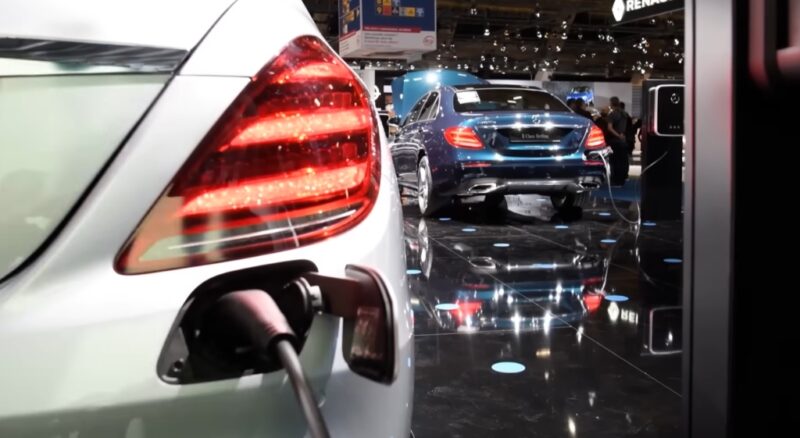Electric cars are no longer just a vision of the future but a growing part of our present. With advancements in technology and a heightened awareness of environmental issues, more people are considering electric vehicles (EVs) as a viable option for their transportation needs.
If you’re contemplating making the switch to electric, you’re not alone in this journey towards a more sustainable and innovative mode of transport.
In this article, you will learn:
- How electric cars contribute to environmental sustainability.
- The economic advantages of owning an electric vehicle.
- The technological innovations that make electric cars a smart choice.
As we discuss electric vehicles, you’ll discover the reasons behind their rising popularity and how they could fit into your lifestyle. Let’s begin.
The Environmental Impact

One of the most compelling reasons to switch to an electric car is its positive impact on the environment.
Electric vehicles (EVs) are known for their significantly lower emissions compared to traditional gasoline-powered cars. This difference is crucial in the fight against climate change and air pollution.
Reduced Carbon Footprint
EVs produce zero tailpipe emissions. While the overall environmental impact depends on the source of the electricity used to charge them, even on a grid partially powered by fossil fuels, electric cars have a smaller carbon footprint.
As the grid becomes greener with more renewable energy sources, this advantage will only grow.
For those interested in exploring a wide range of eco-friendly vehicles, including electric cars, ABetterBid offers an extensive online auction platform where you can find a variety of options to suit your sustainable lifestyle needs.
Sustainability
Ts represents a move towards sustainable driving. They are typically more efficient in converting energy from the grid to power at the wheels and have fewer moving parts, which means less energy is wasted.
This efficiency translates to less reliance on fossil fuels and is a significant step towards sustainable energy use in transportation.
Global Initiatives
Many countries are recognizing the role of electric vehicles in meeting climate goals. Initiatives and policies are being put in place to reduce carbon emissions, with EVs playing a key role.
The shift to electric vehicles is not just a personal choice; it’s part of a global movement towards a more sustainable future.
As we delve into sustainable choices for a greener tomorrow, uncovering key aspects of the environmental movements sheds light on the significance of Earth Day, creating a meaningful bridge to the insights explored in another piece that discusses eco-friendly solutions like electric cars.
Economic Benefits of Owning an Electric Car
Apart from their environmental advantages, electric cars offer several economic benefits that are attractive to consumers.
These benefits not only come in the form of savings but also from various incentives offered by governments and organizations.
Long-term Cost Savings
The initial price tag of an electric vehicle can be higher than that of a traditional car, but the long-term savings are significant.
Electric cars are cheaper to operate since electricity costs less than gasoline on a per-mile basis.
Additionally, the maintenance costs for EVs are lower due to fewer moving parts and a reduced need for regular services like oil changes.
Government Incentives and Tax Benefits
Many governments worldwide are encouraging the adoption of electric vehicles through incentives. These can include tax credits, rebates, and exemptions from certain fees.
In some areas, electric car owners enjoy benefits like reduced registration fees, free parking, and access to carpool lanes, adding to the economic appeal of EVs.
Reduced Operational Costs
The cost of running an electric car goes beyond just savings at the charging station. Electric vehicles have fewer parts that could fail compared to internal combustion engines.
This means fewer repairs and a lower likelihood of encountering a costly mechanical issue, leading to more savings over the life of the vehicle.
Technological Advancements in Electric Cars

The rapid evolution of technology in electric vehicles is one of the most exciting aspects of this automotive revolution.
These advancements are not just about making cars faster or more efficient; they’re about reshaping the driving experience and offering capabilities that were once thought to be futuristic.
Improved Battery Life and Performance
One of the most significant technological leaps in electric cars is the development of more efficient and long-lasting batteries.
Modern EVs offer increasingly impressive range capabilities, alleviating the ‘range anxiety’ that early adopters faced. Advances in battery technology also mean quicker charging times, making electric cars more convenient for longer journeys.
Smart Features and Connectivity
Electric cars are often at the forefront of incorporating advanced technologies. This includes autonomous driving capabilities, sophisticated infotainment systems, and connectivity that integrates seamlessly with our digital lifestyles.
These features not only enhance the driving experience but also improve safety and vehicle management.
Future Prospects
The future of electric vehicles is incredibly promising. Ongoing developments hint at even more efficient powertrains, lighter and more robust materials, and even wireless charging capabilities.
The trajectory of EV technology indicates that electric cars will continue to become more accessible, efficient, and integrated into smart city infrastructures.
Consumer Experience: Driving an Electric Car
Switching to an electric car offers a distinct driving experience that many consumers find pleasantly surprising.
From the quiet operation to the unique features, electric vehicles provide a glimpse into the future of personal transportation.
As we delve into the conscious choices we make to reduce our environmental footprint, one key aspect lies in examining sustainable strategies for businesses, echoing the eco-conscious principles explored in another enlightening piece within this collection.
User Experience and Comfort
Electric cars are known for their smooth and quiet operation, providing a serene driving experience. The instant torque and acceleration they offer is a feature that many drivers appreciate.
Additionally, the interior design of EVs often focuses on maximizing space and comfort, thanks to the compact nature of electric powertrains.
Charging Infrastructure and Travel Range
The expansion of charging infrastructure has made owning an electric car more convenient than ever.
Public charging stations are becoming more widespread, and home charging options are increasingly accessible.
While the travel range of EVs used to be a concern, the latest models offer ranges that are comparable to, and sometimes exceed, those of gasoline vehicles, making them suitable for both daily commutes and longer trips.
Safety Features and Reliability
Electric vehicles are not only about efficiency and performance; they also come equipped with advanced safety features.
Many electric cars have received high safety ratings due to their sturdy construction and the inclusion of active safety technologies. Moreover, the reliability of electric cars is enhanced by their simpler mechanics, which means fewer components that could potentially fail.
Concluding Thoughts

Adopting an electric car is not just a personal transportation choice but a step towards a more sustainable and technologically advanced society. If you’re intrigued by the possibilities and benefits that electric vehicles offer, the natural next step would be to explore the options available in the market.
Consider visiting a local dealership for test drives or attending an EV showcase event. Experiencing an electric car firsthand can provide a clearer perspective and help you make an informed decision about your next vehicle purchase.
Electric cars represent a significant shift in how we think about personal transportation. As the industry continues to evolve, they offer an exciting glimpse into a cleaner, more efficient, and technologically integrated future.
As we delve into sustainable choices for a greener future, the discussion naturally extends to an exploration of environmentally conscious practices, offering readers a comprehensive understanding that complements the focus on electric vehicles in the following article.
Related Posts:
- Hockey Stick Controversy: What Should You Know
- How Do Animals Get Energy? Nature's Powerhouses
- Hybrid vs Electric Cars: Which Is Better for the…
- Hydrogen vs Electric Cars: Which One Offers a Better Future?
- Why Do Foxes Scream at Night? Vocal Enigmas of the Night
- Why Do Moose Have Antlers? - From Decoration to Weaponry








